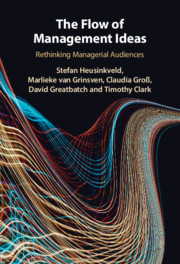Book contents
- The Flow of Management Ideas
- The Flow of Management Ideas
- Copyright page
- Contents
- Figures
- Tables
- Acknowledgements
- 1 The Flow of Management Ideas
- 2 Studying Audiences
- 3 Creating a Positive Atmosphere among the Audience
- 4 Conveying the Applicability of Ideas to Audience Members
- 5 Defining Audience Orientations
- 6 Understanding Audience Dynamism
- 7 Managerial Audiences in Organisational Contexts
- 8 Managerial Audiences and Fan Involvement
- 9 Conclusion
- Appendix A Overview of Informants
- Appendix B Glossary of Transcription Symbols
- References
- Index
2 - Studying Audiences
Published online by Cambridge University Press: 22 May 2021
- The Flow of Management Ideas
- The Flow of Management Ideas
- Copyright page
- Contents
- Figures
- Tables
- Acknowledgements
- 1 The Flow of Management Ideas
- 2 Studying Audiences
- 3 Creating a Positive Atmosphere among the Audience
- 4 Conveying the Applicability of Ideas to Audience Members
- 5 Defining Audience Orientations
- 6 Understanding Audience Dynamism
- 7 Managerial Audiences in Organisational Contexts
- 8 Managerial Audiences and Fan Involvement
- 9 Conclusion
- Appendix A Overview of Informants
- Appendix B Glossary of Transcription Symbols
- References
- Index
Summary
This chapter discusses a number of broad and influential perspectives to studying audiences, explains differences and similarities in background as well as explores their main possibilities in understanding the flow of management ideas. In particular, we consider: (1) research in the field of conversation analysis which is concerned with understanding the way lectures and speeches may influence and transform audiences and in turn, how audience responses may affect speakers’ oratorical performances; (2) the ‘uses and gratification’ approach to studying media audiences which focuses primarily on the reasons and motivations for selecting specific media options and the way various audience activities relate to the nature of audience orientations; (3) more critical traditions of media research focusing on how audience members’ interpretations of media messages relate to their social backgrounds and (4) literature on fans and fandom which provides an important lens to advance understanding of how and to what extent audience members take the ideas beyond a mass communication setting and may even become producers themselves.
Keywords
- Type
- Chapter
- Information
- The Flow of Management IdeasRethinking Managerial Audiences, pp. 22 - 52Publisher: Cambridge University PressPrint publication year: 2021

